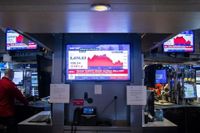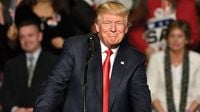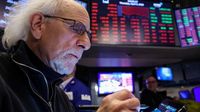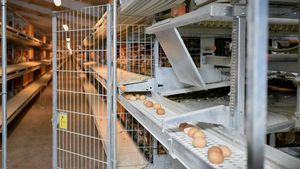The stock market took another pounding on April 4, 2025, as the Dow Jones Industrial Average plummeted by 1,130 points, or 2.8%, following China's announcement of new retaliatory tariffs on U.S. goods. This decline came on the heels of a staggering 1,679.39 point drop the previous day, marking one of the most turbulent periods for investors in recent years.
The S&P 500 slid 3.2% on Friday after shedding 4.84% on Thursday, while the Nasdaq Composite fell 3.5%, with many technology companies heavily exposed to the Chinese market. This follows a 6% tumble in the Nasdaq on April 3, 2025, indicating a severe downturn in the tech sector.
China's commerce ministry announced on April 4 that it would impose a 34% levy on all U.S. products, directly matching the tariffs imposed by President Donald Trump on Chinese goods just two days earlier. This escalation in the trade conflict has raised fears that a full-blown trade war could tip the global economy into recession.
Michael Arone, SPDR chief investment strategist at State Street Global Advisors, commented on the market's reaction, stating, "The Trump administration may be playing a game of chicken with trading partners, but market participants aren't willing to wait around for the results. Investors are selling first and asking questions later." This sentiment was echoed as major companies with significant exposure to China saw sharp declines; Apple and Qualcomm both dropped 3%, while Tesla and Caterpillar fell 3% and 6%, respectively.
Banking stocks also took a hit, with Morgan Stanley dropping 6%, Goldman Sachs shedding 5.5%, and Citigroup sliding 6.6%. The 10-year Treasury yield fell back below 4% as investors fled to bonds for safety, pushing prices up and rates lower. This shift indicates a growing concern among investors about the economic outlook.
The turmoil in the stock market is exacerbated by a mixed picture from the recent U.S. jobs report. The economy added 228,000 jobs in March, significantly above the Dow Jones forecast of 140,000, but the unemployment rate inched up to 4.2%, slightly above expectations. Despite the positive job growth, fears over the escalating trade war overshadowed the employment figures, leading to a pessimistic outlook.
JPMorgan's chief economist Bruce Kasman raised the odds of a global recession to 60% from 40%, citing the potential impact of Trump's tariff policies. He described the full implementation of these tariffs as a "substantial macroeconomic shock not currently incorporated in our forecasts."
As the markets continue to react to these developments, the S&P 500 is now back in correction territory, down about 14% from its all-time high in February. The small-cap focused Russell 2000 index has also entered a bear market, having fallen more than 20% from its last peak.
Investors are now closely watching how the situation unfolds, with many hoping for a resolution before the tariffs take effect on April 10. The volatility index, known as the VIX, spiked to its highest level since August 2024, briefly topping 45, a sign of the market's anxiety.
In Europe, stocks mirrored the downturn in the U.S., with the Stoxx 600 index down 1.67% and banking stocks dropping 5.7%. The DAX index in Germany fell 1.74%, while the U.K.'s FTSE 100 and France's CAC 40 also experienced declines of around 1.3%.
Despite the overall market turmoil, certain sectors have performed well. Consumer staples and utilities have seen positive movements, with staples up 2.4% and utilities on track for a 1.2% advance. Companies like Lamb Weston and Dollar General have thrived amid the chaos, benefiting from their defensive positioning.
GameStop's stock rose nearly 3% in extended trading after CEO Ryan Cohen increased his stake in the company, showing that not all stocks are suffering. However, the broader market sentiment remains bearish as investors digest the implications of the trade war.
As the situation develops, the focus will remain on the potential for further economic fallout from the tariffs and how quickly the markets can stabilize. With the stakes high, both investors and policymakers are bracing for what could be a pivotal moment in U.S.-China relations and the global economy.







